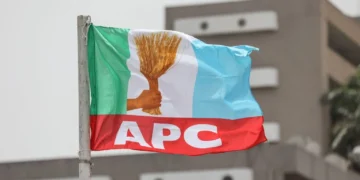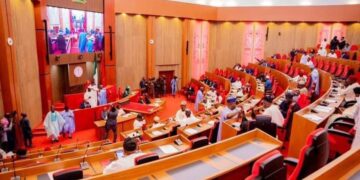By Our Editors
Exclusive investigation reveals lawmakers’ brazen looting of public funds under guise of constituency projects
A damning investigation by BudgIT, Nigeria’s leading civic-tech organisation, has exposed how the National Assembly smuggled a staggering 11,122 projects worth N6.93 trillion into the 2025 federal budget—diverting critical funds into questionable schemes that serve political interests rather than national development.
The findings reveal a disturbing pattern of budget manipulation, where lawmakers, particularly top-ranking members, have turned the appropriation process into a self-enrichment machine.
Among the most egregious discoveries are 238 projects valued at over N5 billion each, amounting to N2.29 trillion, inserted without justification. Another 984 projects worth N1.71 trillion and 1,119 projects between N500 million and N1 billion (totalling N641.38 billion) were haphazardly included, raising serious concerns about their necessity.
What began as isolated irregularities has, over the years, evolved into a deeply entrenched culture of exploitation. The budget process, originally designed as a tool for national development, has been hijacked by political elites who treat it as a personal slush fund. This year’s revelations are particularly alarming, representing a sharp escalation in both the scale and audacity of these insertions.
The investigation shows that these projects are not merely inefficient—they are often entirely disconnected from Nigeria’s development priorities. Many lack proper feasibility studies, location details, or even basic justifications. Instead, they appear to serve as conduits for siphoning public funds into private pockets, with little to no oversight.
The report highlights how key ministries were exploited as conduits for financial mismanagement. Shockingly, 39% of all insertions—4,371 projects worth N1.72 trillion—were forcibly dumped into the Ministry of Agriculture’s budget, inflating its capital allocation from N242.5 billion to an outrageous N1.95 trillion.
Similarly, the Ministries of Science and Technology and Budget and Economic Planning saw their allocations balloon by N994.98 billion and N1.1 trillion respectively, solely from these illegal insertions. This deliberate distortion of budgetary allocations undermines strategic planning, as ministries are forced to manage billions in projects they never requested—many of which are impossible to implement effectively.
Agencies Weaponised for Fraud
Even more brazen was the misuse of obscure agencies to funnel funds. The Nigerian Building and Road Research Institute (Lagos) and the Federal Cooperative College, Oji River—a training institution—were inexplicably assigned projects far beyond their mandates.
For instance, the Federal Cooperative College, which exists to train cooperative society managers, was handed:
-N3 billion for “utility vehicles to support farmers and distribution agents”
-N1.5 billion for rural electrification in Rivers State
-N1 billion for solar streetlights in Enugu State.
These allocations defy logic. The college lacks the technical capacity, personnel, or mandate to execute such projects, raising serious questions about where these funds truly end up.
Dubious Projects Galore
A deeper dive into the padded projects reveals laughable and outright suspicious allocations, including:
-N393.29 billion for 1,477 streetlight projects—many duplicating existing contracts
- N114.53 billion for 538 boreholes—an average cost of N213 million per borehole, far above market rates
-N505.79 billion** for 2,122 vague “ICT projects” with no implementation details
-N6.74 billion for the “empowerment of traditional rulers”—a slush fund disguised as cultural support
Worse, 3,573 projects worth N653.19 billion were directly assigned to federal constituencies, while 1,972 projects worth N444.04 billion were allocated to senatorial districts—clear signs of constituency favouritism rather than national planning.
Presidency’s Deafening Silence
Despite BudgIT’s formal letters to the Presidency, the Budget Office, and the National Assembly in late 2024—detailing these irregularities—no action has been taken. The Presidency’s silence, despite overwhelming evidence, suggests tacit complicity in this financial heist.
This inaction is particularly alarming given President Tinubu’s repeated promises of fiscal responsibility. By failing to rein in the National Assembly’s excesses, the executive branch risks becoming an accomplice to what amounts to institutionalised corruption.
A Betrayal of Public Trust
Gabriel Okeowo, BudgIT’s Country Director, condemned the findings, stating: “The insertion of over 11,000 projects worth N6.93 trillion is not just alarming—it is an assault on fiscal responsibility. Nigeria cannot afford a government of projects without purpose. We need transparency and constitutional clarity to ensure budgets serve citizens”, he said.
The implications are dire. When lawmakers prioritise pet projects over critical infrastructure, healthcare, and education, they directly undermine Nigeria’s development. The 2025 budget, instead of addressing the country’s pressing needs—food insecurity, crumbling roads, and an overstretched power grid—has been turned into a tool for political patronage.
A Call for Urgent Reform
BudgIT has issued several key demands:
- Presidential Intervention: President Tinubu must assert executive authority to stop these insertions and align the budget with the Medium-Term National Development Plan.
- Judicial Review: The Attorney General should seek a Supreme Court interpretation on the legality of the National Assembly’s unilateral project insertions.
- Anti-Graft Action: The EFCC and ICPC must investigate these insertions, track disbursed funds, and prosecute offenders.
- Public Pressure: Citizens, civil society, and the media must demand accountability through sustained advocacy.











































Discussion about this post